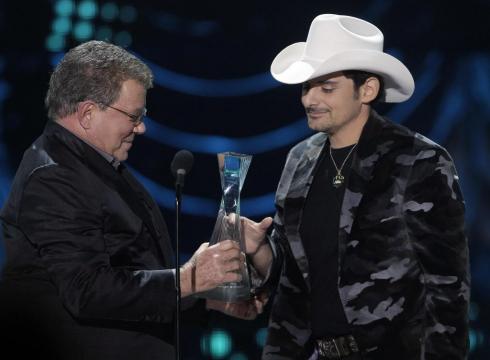
Image Credit: Mark Humphrey, AP
The media reacted volubly to Brad Paisley's song "Accidental Racist," a ballad on his newly released "Wheelhouse" album that openly tackles the problem of racism. Staging a dialogue between Paisley and rapper LL Cool J, the song imagines the tense process of "remembering and forgetting" slavery, as one critic put it, from highly stereotyped white and black perspectives. Many voices from the blogosphere last week, including Stewart and Harris from Jezebel and Slate, fumed at the song's presentation of racial history and relations, while others viewed it as simply a provocative song characteristic of Paisley's other work. That it was selected by the NYTimes.com for one of the online "Room for Debate" forums is, perhaps, an indication of how ripe the song's lyrics are for critique and how generative they are of competing rhetorics.
Here I will consider how controversial lyrics from "Accidental Racist" alongside resonant verses from Paisley and other mainstream country artists foreground surfaces and appearances--clothing, physique, and color, for instance--to talk about identity, race, and social perceptions.

Image Credit: www.bet.com
One of the verses from "Accidental Racist" that has caused contention is Cool J's line, "If you don't judge my gold chains / I'll forget the iron chains." Critics object to the implication that white people overlooking a "black" fashion choice is somehow equivalent to black people forgetting about slavery altogether. Setting aside the offensiveness of this equation, I'd just like to point out that the line centers around a clothing accessory and also the suggestion that while such objects can inspire misjudgment and misunderstanding they can also be imbued with meanings that have deep consequences for race relations. I would argue that the song's frequent references to racialized apparel--a white cowboy hat, "invisible white hoods," a Skynyrd t-shirt with a red confederate flag on it, saggy pants, and a do-rag--are not so accidental, and that they fit in with a tendency in Paisley's work to appropriate and explode a certain kind of visual stereotype.
Take for instance, Paisley's tune "Online" from his 2007 album "Fifth Gear." Seemingly just a goofy song about online dating it actually engages with larger questions about anonymity, identity, and personal interaction on the Web, and it does so primarily by parodying the way we enhance our digital appearances.
The song begins with its protagonist enumerating what he calls his "stats," details about his height, weight and livelihood:
I work down at the pizza pit
And I drive an old Hyundai
I still live with my mom and dad
I'm 5'3 and overweight
Despite this profile, which, within the heteronormative frame of the song is represented as hopelessly pathetic, the singer is buoyed by the way he looks online:
'Cause online I'm out in Hollywood
I'm 6'5 and I look damn good
I drive a Maserati
I'm a black belt in Karate
And I love a good glass of wine
The sketch of the subject's "real" appearance and that of his constructed online persona present radically different versions of maleness; the one resembles adolescence and the other independence and success. Yet the descriptions are similar in their form and artificiality; neither evokes an image of a real person but rather two poles of a cartoonish spectrum of male desirability. Thus, beyond the song's main lesson--that people "grow another foot" and "lose a bunch of weight" when they portray themselves online--is the notion that a list of personal "stats," like the sort found on Facebook or used to size up a date, fail to express a person's true identity even though they can help with reinvention, profilerating online a "whole 'nother me."
The basic paradox presented in "Online," that while appearances are only skin deep they have real effects and consequences, also underlies the interplay between appearance and perceptions in "Accidental Racist." Paisley articulates the paradox when he apologizes to the black man he meets behind the Starbucks counter,
When I put on that t-shirt, the only thing I meant to say is I'm a Skynyrd fan
The red flag on my chest somehow is like the elephant in the corner of the south
In my next post on this subject, I'll look at Paisley's 2011 song "Camouflage" to further examine his interest in fabric and color and their ideological freight.


Recent comments
2 years 29 weeks ago
2 years 44 weeks ago
2 years 44 weeks ago
2 years 50 weeks ago
3 years 4 weeks ago
3 years 4 weeks ago
3 years 4 weeks ago
3 years 6 weeks ago
3 years 6 weeks ago
3 years 6 weeks ago